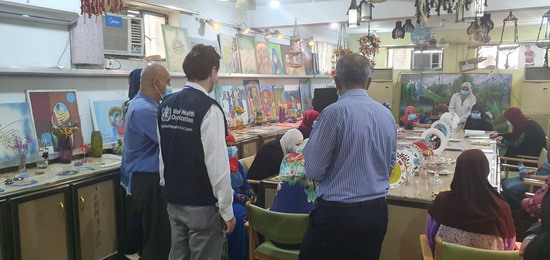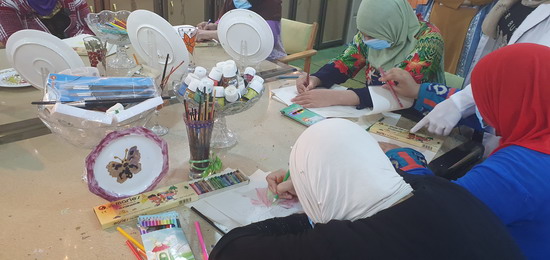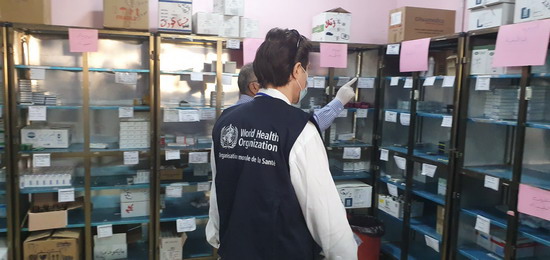
16 November 2020 – Around one in 10 people, approximately 792 million people globally, have a mental health or substance use disorder, contributing to 10% of the global burden of disease. In Iraq, the demand for mental health services is on the rise amid the COVID-19 pandemic and remains one of the top priority areas requiring support.
Al-Rashad Psychiatric Hospital is the largest mental health facility in Iraq. It consists of 24 wards and is a long-stay residential facility. Despite its overall capacity of 1200 beds, the hospital is currently accommodating more than 1440 people. According to the hospital manager, Dr Ali Rasheed Al-Rikabi, except for those patients admitted to the forensic unit, the remaining patients are residential and are never discharged.
Karim, 62-years old, has been in the hospital for 38 years. Even though his recovery and clinical conditions do not warrant him remaining at the facility, Karim is still hospitalized. The long stays at the facility and lack of community-based mental health services contribute to the nearly non-existent social reintegration of people with mental disorders in the community.
Karim is not alone; several other people like him whose mental health status have improved are still living at the hospital. This is because they either have no place to go back to or their families cannot take them because of limited space in their houses or fear of the unknown.

Khudhair Abbas Mohammed Ali, 59-years old, has been in and out Al-Rashad Psychiatric Hospital since 1981. It is now 17 years since his last re-admission to this facility. But he has not seen any of his relatives for the past several months. Like Karim, he looks forward to getting out of the mental health facility and living everyday life.
"I was born in Baghdad, and it would be good to get out there again. I miss my relatives, I have 3 sisters and brothers, but it has been several months since they came to see me. My nephew used to visit me, but he suddenly stopped. I miss my family so much. Help me to get access to them," said Mohammed.
"At this facility, I support my friends, I shave their hair and give talks on mental health, and when there is a medical emergency, I go out of my way to inform the hospital authorities. I can do a lot more when I get out there," added Mohammed.
According to Dr Ali Rasheed Al-Rikabi, many people currently admitted at the hospital do not have clinical reasons to be hospitalized. They are clinically fully recuperated and should leave the facility. However, due to insufficient implementation of community-based mental health facilities, the support provided to people with mental conditions and their family members, along with the lack of housing, prevents them from reintegrating into the community. The hospital manager recommends implementing a deinstitutionalization strategy to reduce the volume and role of psychiatric hospitals in favour of community-based mental health networks.
A model that WHO supports: "Looking at the state of many people suffering from mental disorders, WHO will advocate for the Ministry of Health to include a robust deinstitutionalization component in the national mental health strategy,' said Dr Adham Ismail, the WHO Representative in Iraq. "We will reach out to health authorities in Iraq and donors to recommend support,” added Dr Adham.
WHO also recommends that the Ministry of Health collaborate with mental health partners to implement the WHO Quality Rights Initiative, which aims to improve access to quality mental health and social services and promote the rights of people with mental health conditions, psychosocial, intellectual and cognitive disabilities.
Over the past few years, WHO has worked closely with the Ministry of Health to strengthen mental health at the national and local levels through capacity-building and providing mental health supplies like medicines. WHO advocates for developing and strengthening mental health services that are community-based and human rights-oriented.

Iraq has been experiencing restrictions on movement as a result of COVID-19, incidents of gender-based violence, child abuse, and domestic violence; however, there has been a minimal increase in the number of residents in Al-Rashad Hospital as a result of the pandemic. To date, the hospital has recorded 32 COVID-19 positive cases among residents at the facility.
WHO appeals to donors to support mental health interventions in Iraq, especially during this period, where many people are suffering from consequences of COVID-19 and where war and economic strains have negatively impacted mental health. WHO also advocates for more support in strengthening community-based management of mental health and establishing residential facilities, aware that mental health programmes are underfunded not only in Iraq but globally.
For more information or to request media interviews, please contact:
Pauline Ajello
Communications Officer
+964 7729 877 288
Andrea Bruni
Mental Health Officer
+964 7822111737
Ajyal Sultani
Communications Officer
+964 7740 892 878








